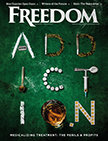Vol. 46, Issue 4 ‣ perspective
On Survival Ted Chabasinski
In 1944, a 6-year-old boy so intellectually gifted he jumped from first grade to third was taken from his home in the Bronx to New York’s Bellevue Hospital. There psychiatrist Lauretta Bender pronounced him “schizophrenic” and began a series of 20 electro-convulsive shocks. The boy, Ted Chabasinski, was one of hundreds of children used in ECT experiments by Bender, tests since condemned as barbaric.
Chabasinski survived and became active in the civil rights movement and ultimately an attorney. He led a successful effort to ban ECT in the city of Berkeley, California, in 1982, a measure that well-funded psychiatric interests later overturned. As a patients’ rights lawyer, Chabasinski has continued to champion human rights, and writes, speaks, and blogs on issues of individual rights and freedoms. As Freedom went to press, he was considering plans to launch an initiative to ban ECT in Portland, Oregon.

How would you describe your ECT experience with Lauretta Bender?
It was totally terrifying. It was like I was being put to death, over and over. I had no idea, at the age of 6, why this was being done to me. When you experience something like that so young, it so disrupts who you are that you never catch up. Her general attitude was a depraved indifference to human life, a depraved indifference to anybody’s welfare.
What were the circumstances of how it happened?
I was just bopping along, having a pretty normal childhood, but because my birth mother had been diagnosed with schizophrenia, whatever that might be, they decided I must be schizophrenic, too. My foster parents were nice people, but they had no power to stop it. They didn’t know how to fight it.
So then, as now, it amounts to sticking on a label?
Right. Psychiatrists give a person a label and then say, “See, we just gave him a label of schizophrenia, and this proves schizophrenia is inherited.” Well, there was nothing wrong with me.
And how was life when you left Bellevue?
When I went back to my neighborhood in the Bronx, I couldn’t remember. There was this boy named Karl that they said had been my best friend. I didn’t remember who he was. I was terrified and clung to my foster mother. Before shock treatment, I used to feel like a really big boy. I would ride my tricycle through the neighborhood and never got lost. But when I finally decided to take my tricycle out again, I got lost. Shock treatment had wiped out my mental map of the neighborhood. That was terrifying as well.
Coercive treatment today usually means drugs.
Being drugged through your childhood means you’re just not there to experience life. You don’t mature and grow. You can’t learn from your experiences when you’re so numbed down and drugged you barely know what’s happening.
The American Psychiatric Association fought the Berkeley ban.
They spent about 10 times as much as we did. But we did very well. The ballot measure passed by a large margin—62 to 38 percent.
One group dedicated to wiping out ECT is CCHR.
When Berkeley was considering the ban on shock treatment, I got a call from CCHR and they asked, “Do you want us to come in with all guns blazing?” They participated very nicely and got a lot of signatures. I’ve had a lot of contact with CCHR over the years. I think their literature is especially wonderful. I find it really hard-hitting. I’d be proud to have written it myself.
What would you say to someone considering ECT?
Get fully informed. Do thorough research before irreparable damage is done. When we had a hearing before the Human Relations and Welfare Commission in Berkeley, many people testified about how shock had harmed them. The psychiatrists could not produce one witness who said it had helped. Not one.





























